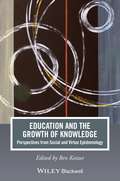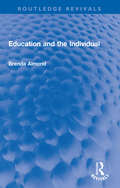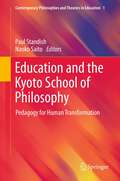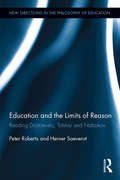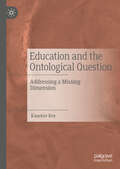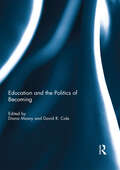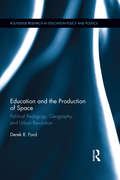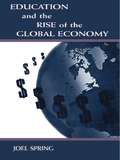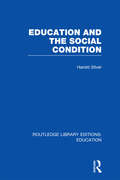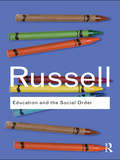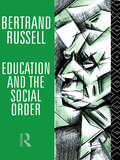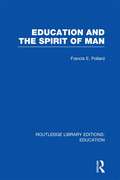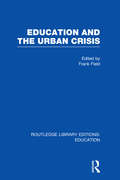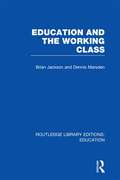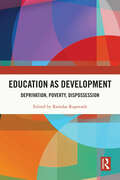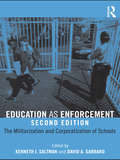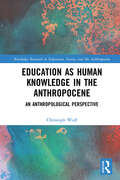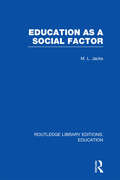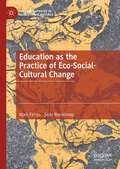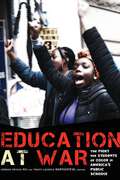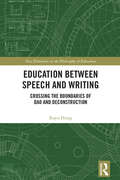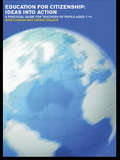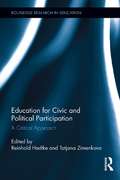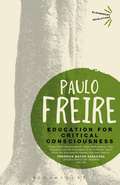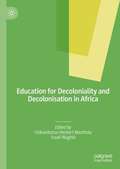- Table View
- List View
Education and the Growth of Knowledge: Perspectives from Social and Virtue Epistemology (Journal of Philosophy of Education)
by Ben KotzeeEducation and the Growth of Knowledge is a collection of original contributions from a group of eminent philosophers and philosophers of education, who sketch the implications of advances in contemporary epistemology for education. New papers on education and social and virtue epistemology contributed by a range of eminent philosophers and philosophers of education Reconceives epistemology in the light of notions from social and virtue epistemology Demonstrates that a reconsideration of epistemology in the light of ideas from social and virtue epistemology will in turn re-invigorate the links between epistemology and education
Education and the Individual (Routledge Revivals)
by Brenda AlmondFirst published in 1981, Education and the Individual presents a reasoned case for maintaining the maximum freedom of choice in education in those areas where the interests of the individual and the state conflict. The book argues that ultimately the freedom to opt out of the education system altogether must be protected, as well as the freedom to choose a religious education in a secular state, or a secular education in a religious state, and freedom from political indoctrination. It analyses what is required of education in a liberal society, and explores its implications for the wider international context of human rights. It also promotes the basic rights of freedom of choice in education and, wherever conflict is inevitable, it argues for the issue to be settled in favour of the individual, rather than the state. Education and the Individual will appeal to those with an interest in the history of education, the philosophy of education, and the relationship between education and politics.
Education and the Kyoto School of Philosophy
by Naoko Saito Paul StandishThe work of the Kyoto School represents one of the few streams of philosophy that originate in Japan. Following the cultural renaissance of the Meiji Restoration after Japan's period of closure to the outside world (1600-1868), this distinctly Japanese thought found expression especially in the work of Kitaro Nishida, Keiji Nishitani and Hajime Tanabe. Above all this is a philosophy of experience, of human becoming, and of transformation. In pursuit of these themes it brings an inheritance of Western philosophy that encompasses William James, Hume, Kant and Husserl, as well as the psychology of Wilhelm Wundt, into conjunction with Eastern thought and practice. Yet the legacy and continuing reception of the Kyoto School have not been easy, in part because of the coincidence of its prominence with the rise of Japanese fascism. In light of this, then, the School's ongoing relationship to the thought of Heidegger has an added salience. And yet this remains a rich philosophical line of thought with remarkable salience for educational practice. The present collection focuses on the Kyoto School in three unique ways. First, it concentrates on the School's distinctive account of human becoming. Second, it examines the way that, in the work of its principal exponents, diverse traditions of thought in philosophy and education are encountered and fused. Third, and with a broader canvas, it considers why the rich implications of the Kyoto School for for philosophy and education have not been more widely appreciated, and it seeks to remedy this. The first part of the book introduces the historical and philosophical background of the Kyoto School, illustrating its importance especially for aesthetic education, while the second part looks beyond this to explore the convergence of relevant streams of philosophy, East and West, ranging from the Noh play and Buddhist practices to American transcendentalism and post-structuralism.
Education and the Limits of Reason: Reading Dostoevsky, Tolstoy and Nabokov (New Directions in the Philosophy of Education)
by Peter Roberts Herner SaeverotIn recent decades, a growing body of educational scholarship has called into question deeply embedded assumptions about the nature, value and consequences of reason. Education and the Limits of Reason extends this critical conversation, arguing that in seeking to investigate the meaning and significance of reason in human lives, sources other than non-fiction educational or philosophical texts can be helpful. Drawing on the work of Dostoevsky, Tolstoy and Nabokov, the authors demonstrate that literature can allow us to see how reason is understood and expressed, contested and compromised – by distinctive individuals, under particular circumstances, in complex and varied relations with others. Novels, plays and short stories can take us into the workings of a rational or irrational mind and show how the inner world of cognitive activity is shaped by external events. Perhaps most importantly, literature can prompt us to ask searching questions of ourselves; it can unsettle and disturb, and in so doing can make an important contribution to our educational formation. An original and thought provoking work, Education and the Limits of Reason offers a fresh perspective on classic texts by Dostoevsky, Tolstoy and Nabokov, and encourages readers to reconsider conventional views of teaching and learning. This book will appeal to a wide range of academics, researchers and postgraduate students in the fields of education, literature and philosophy.
Education and the Ontological Question: Addressing a Missing Dimension
by Kaustuv RoyThis book identifies and expands upon the link between ontology and education, exposing a lack of ontological inquiry as the vital missing element in the study and practice of modern education today. In this book, Roy aims to reintroduce ontological thinking and reasoning that grounds historical and modern educational understandings and practice. Beginning with a historical perspective, he then turns to examine the results of his scholarship into practical concerns of education such as language, dialogue, and curriculum: ultimately proposing a new way forward emphasizing a balance in the education effort between epistemic content and ontological disclosure.
Education and the Politics of Becoming
by Diana MasnyThis collection examines education in the light of a politics of becoming. It takes a non-hierarchical transdisciplinary approach, challenging the macropolitics of pre-established governmental and economic agendas for education. Drawing on the philosophy of Gilles Deleuze and Felix Guattari, the contributors consider questions such as how education might engage a politics of becoming, and how education and becoming function in a society of control. Since Deleuze and Guattari contend that a society is defined by its becomings, its transformations, this collection asks how education, itself a process in becoming, may contribute "collective creations" to a society in continual flux.The chapters bring theory and praxis together, deploying power, affect, cartography, space, relationality, assemblage and multiple literacies in order to experiment with music, art, language, teacher education, curriculum and policy studies. This collection is an innovative resource, creating an encounter with the macropolitics of education, and altering teaching, learning, evaluation and curriculum. This book was originally published as a special issue of Discourse: Studies in the Cultural Politics of Education.
Education and the Production of Space: Political Pedagogy, Geography, and Urban Revolution (Routledge Research in Education Policy and Politics)
by Derek R. FordEmerging from a radical pedagogical tradition, Education and the Production of Space deepens and extends Henri Lefebvre’s insights on revolutionary praxis by revealing the intimate relationship between education and the production of space. Synthesizing educational theory, Marxist theory, and critical geography, the book articulates a revolutionary political pedagogy, one that emerges as a break from within—and against—critical pedagogy. Ford investigates the role of space in the context of emerging social movements and urban rebellions, with a focus on the Baltimore Rebellion of 2015, and shows how processes of learning, studying, and teaching can help us produce space differently, in a manner aligned with our needs and desires.
Education and the Rise of the Global Economy (Sociocultural, Political, and Historical Studies in Education)
by Joel SpringJoel Spring investigates the role of educational policy in the evolving global economy, and the consequences of school systems around the world adapting to meet the needs of international corporations. The new global model for education addresses problems of technological change, the quick exchange of capital, and free markets; policies to resolve these problems include "lifelong learning," "learning societies," international and national accreditation of work skills; international and national standards and tests; school choice; multiculturalism; and economic nationalism. The distinctive contribution Spring makes is to offer an original interpretive framework for examining and understanding the interconnections among education, imperialism and colonialism, and the rise of the global economy. He offers a unique comparison of the educational policies of the World Bank, the United Nations, the European Union, and the Organization for Economic Development and Cooperation. Additionally, he provides and weaves together important historical and current information on education in the context of the expansion of international capitalism; much of this information, gathered from many diverse sources, is otherwise not easily available to readers of this book. In the concluding chapters of the volume, Spring presents a thoughtful analysis and a powerful argument emphasizing the importance of human rights education in a global economy. This volume is a sequel to Spring's earlier book, Education and the Rise of the Corporate State (1972), continuing the work he has been engaged in since the 1970s to describe and analyze the relationship between political, economic, and historical forces and educational policy.
Education and the Social Condition (Routledge Library Editions: Education)
by Harold SilverThis book reviews the educational experience of the 1960s and 1970s and to suggest ways of approaching major contemporary themes such as equality, accountability and standards. The author underlines a nineteenth and twentieth-century sociological tradition in analysing education and covers a range of educational themes including aspects of schooling and higher education, education as social policy, knowledge as power, and teaching and adolescence. He draws on the social history of many of the processes, concepts and debates. Parts of the book derive from research into the history and contemporary forms of these problems in the USA. The volume therefore illuminates important contemporary issues in education and society by using historical, sociological and comparative insights.
Education and the Social Order
by Bertrand RussellBertrand Russell was renowned for his provocative views on education. Considered an educational innovator, Russell attempted to create the perfect learning institution. Despite the failure of this practical vision, it did not stop him from continuing to strive towards inventing and arguing for a system of education free from repression. In Education and the Social Order, Russell dissects the motives behind educational theory and practice, and in doing so lays out original and controversial arguments for the reformation of the education of the individual.
Education and the Social Order (Routledge Classics Ser.)
by Bertrand RussellDespite the disastrous failure of his one practical attempt to create a perfect school, Russell constantly strove to invent a system of education free from repression. Here Russell dissects the motives behind much educational theory and practice - and attacks the influence of chauvanism, snobbery and money. Energetically discussed and debated are discipline, natural ability, competition, class distinction, bureaucracy, finance, religion, sex education, state versus private schools, education in Russia, indoctrination, the home environment and many other topics. Described by reviewers as 'brilliant', 'provocative', 'sane', 'stimulating', 'practical', and 'original', this book contains the essence of Russell's thought on education and society.
Education and the Spirit of Man (Routledge Library Editions: Education #151)
by Francis PollardThis volume was the Swarthmore Lecture for 1932, one of an annual series of lectures delivered by and for members of the Society of Friends (Quakers). The lecture discusses the place of education and moral philosophy in the world of the early twentieth century, as well as the place of religious discipline in education.
Education and the Urban Crisis (Routledge Library Editions: Education)
by Frank FieldBased on two conferences, this volume explores trends during the 1960s and 1970s in inner city areas in the United Kingdom. It describes how the inner city is losing jobs and skilled workers and, as the population falls, the number of disadvantaged people and those claiming benefits is increasing. To what extent, the book asks, does the educational system contribute to or alleviate Britain’s urban crisis? In answering this question, the contributors examine the complex interrelationships between educational, economic and social problems, and point out that one of the major weaknesses of the present educational system in Britain is that it is in no way linked to the labour market. They suggest how schools could be better linked to local employment opportunities while at the same time offering more culturally varied educational opportunities. They also analyze Britain’s urban programme and show that it in no way matches up to what is required if poverty – which is seen as the root of the urban crisis – is to be eradicated.
Education and the Working Class (Routledge Library Editions: Education #179)
by Brian Jackson Dennis MarsdenWhen first published this book had a significant influence on the campaign for comprehensive schools and it spoke to generations of working-class students who were either deterred by the class barriers erected by selective schools and elite universities, or, having broken through them to gain university entry, found themselves at sea. The authors admit at the end of the book they have raised and failed to answer many questions, and in spite of the disappearance of the majority of grammar schools, many of those questions still remain unanswered.
Education as Development: Deprivation, Poverty, Dispossession
by Ramdas RupavathThis book is an in-depth analysis of the educational development of tribals in India. Education as Development: Deprivation, Poverty, Dispossession is a significant new addition for understanding educational and economic setbacks experienced by the marginalized in India. The volume:• Focuses on how the social, economic and education systems have evolved over time in India and identifies the scope of development in these areas;• Provides a rational structure for readers to understand how the Adivasi in India can be made to fit in the modern designed education system;• Highlights the problems of the marginalized – such as income inequality, education, health, housing, governance, civil society environment and infrastructure and others which hampers their overall growth. This book will be of great interest to students and researchers and policy makers in the fields of education, minority studies, indigenous studies, sociology of education, and South Asian studies.
Education as Enforcement: The Militarization and Corporatization of Schools
by Kenneth J. SaltmanThe first volume to focus on the intersections of militarization, corporations, and education, Education as Enforcement exposed the many ways schooling has become the means through which the expansion of global corporate power are enforced. Since publication of the first edition, these trends have increased to disturbing levels as a result of the extensive militarization of civil society, the implosion of the neoconservative movement, and the financial meltdown that radically called into question the basic assumptions undergirding neoliberal ideology. An understanding of the enforcement of these corporate economic imperatives remains imperative to a critical discussion of related militarized trends in schools, whether through accountability and standards, school security, or other discipline based reforms. Education as Enforcement elaborates upon the central arguments of the first edition and updates readers on how recent events have reinforced their continued original relevance. In addition to substantive updates to several original chapters, this second edition includes a new foreword by Henry Giroux, a new introduction, and four new chapters that reveal the most contemporary expressions of the militarization and corporatization of education. New topics covered in this collection include zero-tolerance, foreign and second language instruction in the post-9/11 context, the rise of single-sex classrooms, and the intersection of the militarization and corporatization of schools under the Obama administration.
Education as Human Knowledge in the Anthropocene: An Anthropological Perspective (Routledge Research in Education, Society and the Anthropocene)
by Christoph WulfThis book examines the concepts of the Anthropocene and globalisation in our society and the changes that these are bringing about in education and human learning. The book argues that there needs to be reflexive approach to issues that affect the fate of the planet and the future of humans, brought about by an education that looks to the future. Wulf argues that a change in education and socialization can only succeed based on an understanding of previous educational ideas, and considers the significance of Confucianism and spiritual education that emerged in the East. The book traces key educational ideas throughout history to show how education and human knowledge are closely linked, highlighting the need for us to pay careful attention to repetition, mimesis and the imagination in learning. It shows how a future-oriented education must engage with issues of peace and violence, global citizenship and sustainable development. This timely and compelling book will be of great interest to researchers, academics and students in the fields of philosophy of education, the history and anthropology of education, sustainability education and global citizenship education
Education as a Social Factor (Routledge Library Editions: Education)
by Leonard M JacksThis volume presents a short survey of education at the beginning of the twentieth century. It considered the main educational agencies of that time, the home, the Church, the school and the university and the role to be played by each in preparing the citizens of the future. The author maintains that religion and education are intimately connected and therefore he discusses education in its broadest sense: preparation for being not just a citizen in the United Kingdom but in human existence as a whole.
Education as the Practice of Eco-Social-Cultural Change (Palgrave Studies in Educational Futures)
by Sean Blenkinsop Mark FettesThe current ecological crisis is the consequence of entrenched attitudes, discourses and behaviours in human societies worldwide, fostered and reinforced through modern educational traditions, processes and institutions. This book envisions a radical transformation of education to focus on the mutual flourishing of human societies with the rest of life on Earth. In part, the authors suggest approaching this as a problem of systemic design, incorporating principles that challenge and undermine key premises of the Capitalocene—the socio-economic-political landscape sustaining the current educational regime. Tracing the implications of this transition, they review core assumptions of modern Western culture that need to shift, and identify a wide range of relevant capacities and practices grouped under four complementary educator “stances” for eco-social-cultural change.
Education at War: The Fight for Students of Color in America's Public Schools
by Arshad Imtiaz Ali and Tracy Lachica BuenavistaEducation at War: The Fight for Students of Color in America's Public Schools, attempts to shape educational research and practice to more explicitly consider the relationship between education, capitalism and war, and more specifically, its’ impact on students of color. The authors, as a whole, contend that the contemporary specter of war has become a central way that racism and materialism become manifested and practiced within education. In particular, this collection asserts that the contemporary neoliberal characterization of education and school-based reform is situated within the global political economy that has facilitated a growth in the prison and military industrial complex, and simultaneous divestment in education domestically within the U.S.Education at War attempts to make research relevant by bringing the tensions within young people’s lives to the fore. The heavy shadow cast by recent U.S. led wars re-organizes the sites of learning and teaching nationally, as well as differentially, within specific sites and upon particular communities. Nonetheless, the examination of this context is not enough. Rather, we consider how such a contemporary context can facilitate educational spaces for communities and youth to grow their vision for a different, and hopefully a more humanizing future. Thus, the book contributors will collectively explore how resistance can produce the opportunity for rich, diverse and transformative learning for marginalized students and communities.The lives of People of Color are the forefront of Education at War: The Fight for Students of Color in America's Public Schools. Whereas there are many attempts to theorize about the global implications of war, less attention is paid to the ways that war shapes young lives in the U.S., particularly in an educational context. The book addresses the absence of youth-centered discussions regarding education during a political context of neoliberalism and war, and provides important perspectives on which to ground critical discussions among students and families, education scholars and practitioners, and policymakers.
Education between Speech and Writing: Crossing the Boundaries of Dao and Deconstruction (New Directions in the Philosophy of Education)
by Ruyu HungThis unique book explores how graphocentrism affects Chinese education and culture. It moves away from the contemporary educational practices in China of following the Western model of phonocentrism, to demonstrate that each perspective interacts and counteracts with each other, creating a dialogue between Eastern and Western thought. Chapters explore the consonances and dissonances between the two, problematizing the educational practices of Chinese tradition and proposing a dialectical thinking of post-graphocentrism, based on the concepts of Dao and deconstruction. The volume creates a unique area in the field of philosophy of education by questioning the writing/speaking relationship in Chinese tradition, complete with educational ideas and practices that consider the uniqueness of Chinese character writing. A pioneering study of its kind, Education between Speech and Writing provides a valuable source for students of philosophy of education, as well as students and academics in the field of Chinese Studies. The book will also appeal to anyone interested in dialogues between Chinese and Western thoughts, especially negotiating between Daoism and deconstruction.
Education for Citizenship: A Practical Guide for Teachers of Pupils Aged 7-14
by Cathie Holden Nick CloughThis clear and user-friendly text provides practical guidance on how to incorporate citizenship into the curriculum. It offers a wealth of teaching aids including: * tried-and-tested photocopiable materials* case studies * suggested teaching strategies* comprehensive reference and resource section. Nick Clough and Cathie Holden are fully experienced in the field having both taught in primary and middle schools and both now specialise in providing citizenship education courses for trainee teachers and practising teachers. This up-to-date book will help engage those teaching (and studying) the new requirement of Education for Citizenship at Key Stages 2 and 3, and along with lively examples of pupils' work and discussions of the changes to the QCA guidelines regarding citizenship, they provide a comprehensive and complete resource. It is also of immense value to curriculum coordinators and to those wishing to know more about the thinking behind education for citizenship.
Education for Civic and Political Participation: A Critical Approach (Routledge Research in Education #92)
by Reinhold Hedtke Tatjana ZimenkovaParticipation as an element of active citizenship in democracies is a key project of international and national educational policy. Institutionalized approaches for compulsory schools provide participatory access to all young European citizens. But does this picture depict the possibilities and practices of participation appropriately? Can this standard approach to participation be translated into action in view of diverse polities, policies, political cultures, institutions and practices of participation? This book explores what prerequisites must be given for a successful implementation of such a comprehensive international project.
Education for Critical Consciousness
by Paulo FreireFamous for his advocacy of 'critical pedagogy', Paulo Freire was Latin America's foremost educationalist, a thinker and writer whose work and ideas continue to exert enormous influence in education throughout the world today. Education for Critical Consciousness is the main statement of Freire's revolutionary method of education. It takes the life situation of the learner as its starting point and the raising of consciousness and the overcoming of obstacles as its goals. For Freire, man's striving for his own humanity requires the changing of structures which dehumanize both the oppressor and the oppressed.
Education for Decoloniality and Decolonisation in Africa
by Yusef Waghid Chikumbutso Herbert ManthaluThis book focuses on understandings of higher education in relation to notions of decoloniality and decolonization in southern Africa. The volume draws on a range of case studies in multiple politico-cultural contexts on the African continent, and examines some of the challenges to be overcome in order to achieve education for decolonization and decoloniality. Acknowledging that patterns of exclusion, inequality and injustice are still prevalent in the African higher education landscape, the editors and contributors proffer bold attempts at democratizing education and examine how to cultivate just, equal and diverse pedagogical relations. Featuring case studies from South Africa, Zambia, Malawi, and Zimbabwe, the authors and editors examine how higher education can be further democratized and transformed along the lines of equality, liberty and recognition of diversity. This hopeful and bold collection will be of interest to scholars of decoloniality and decolonization in higher education, as well as higher education in southern Africa more specifically.
